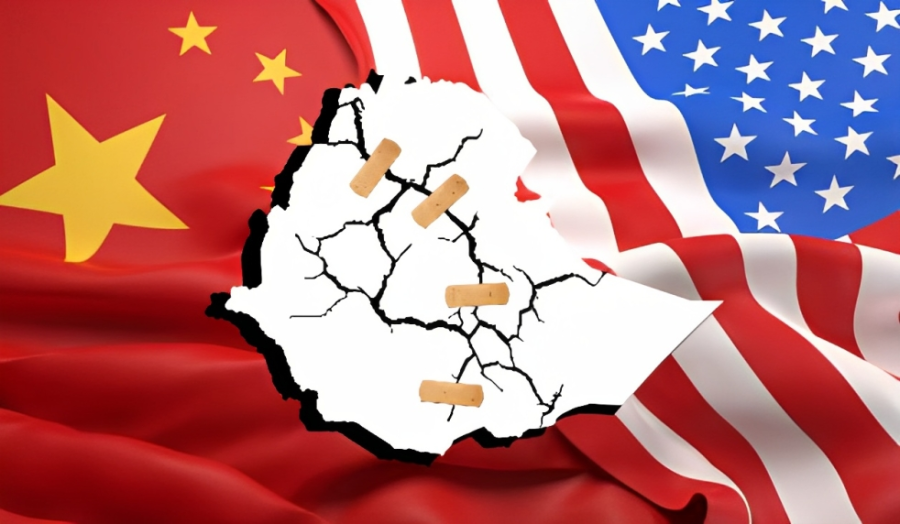OPINION: How can the US Help Ethiopia After its Civil War?
Ethiopia’s civil war, which has been raging since 2020, has finally ended after a ceasefire was called between the Ethiopian government and rebels. Design by Caleb Masterson
February 20, 2023
The Ethiopian government and northern Ethiopian rebels agreed to a ceasefire on Nov. 3, 2022, bringing an uncertain end to a civil war that has been raging since 2020. The hostilities had spiraled into a regional conflict involving Ethiopia’s neighbor countries Somalia and Eritrea, leaving humanitarian disasters and untold destruction in the Horn of Africa. Now that a fragile peace has returned to the region, Ethiopia must take action to recover and the United States has a chance to define its role in the changing African landscape. Before the U.S. can aid Ethiopia, however, it must understand how the war began in the first place.
The war was fought primarily in the Tigray region, in the extreme north of Ethiopia. The present Ethiopian country is composed of a large number of distinct cultures and ethnic groups; prior to 1974, Ethiopia was an empire built upon conquered nations, where a caste system of cultures existed. The Tigrayans were a culture making up only six percent of the Ethiopian population, yet they were able to seize power over the entire country in 1974 after a communist revolution. Under Tigrayan leadership, an iron-fisted authoritarian regime rigged elections and jailed political activists, whilst prioritizing resources for the Tigray culture over others in Ethiopia.
After more than four decades of totalitarian rule, anti-government protests reached their apex in 2017, forcing the Prime Minister of Ethiopia to resign. The vacancy was filled by Abiy Ahmed, who became the youngest leader in Africa at age 42. Ethiopians saw Abiy as a dynamic politician and a man who could bring change and democracy to his country. He was not Tigrayan and quickly moved to free political prisoners of the previous regime, while launching anti-corruption campaigns that actively removed Tigrayans and their influence from the government.
While Abiy’s initial work was seen as a revolutionary pivot towards democracy, he soon fell back into the mold of his predecessors. Abiy began to abuse his power, jailing thousands of protestors and political opponents in military camps just as the Tigrayans had done before him. Abiy was accused of using vague, trumped-up or false charges of corruption to attack Tigrayans. Protestors also claimed Abiy used the COVID-19 pandemic as unjustified grounds to indefinitely postpone Ethiopian elections and prolong his tenure in office.
The Tigray region, in defiance, held their own elections in November of 2020; a treasonous act in the Ethiopian government’s eyes. Within days, Abiy ordered all-out military action against the Tigrayans, officially sparking the war. Ethiopia drew military assistance from the neighboring nations of Eritrea and Somalia, and imported military drones from Iran, Turkey and China. While the war can be considered to be over, its impacts will linger on for years to come.
The Ethiopian government forces have been accused by international governments of widespread war crimes during their attack on Tigray. The United Nations (UN) claims that Abiy deliberately cut off Tigray from essential food and supplies and prevented international humanitarian aid from reaching desperate areas. Widespread reports of civilian massacres, kidnappings and sexual violence have also been disclosed. Extreme famine and spread of disease persist in the region, both problems partially man-made because of Abiy’s blockade of supplies.
It is estimated that over $20 billion in damages must be paid to rebuild the war-torn nation, and the country is not exempt from the already-extant worldwide patterns of inflation. To prevent a total economic collapse in Ethiopia, other nations must bear some of the debt. International reserves have paid for Ethiopia to import goods for an initial period of less than one month. However, the Ethiopian government says it needs such assistance for at least three months to allot enough funding to commence major recovery efforts. The nation is already deep in foreign debt, and organizations like the International Monetary Fund and the World Bank are expected to pressure Abiy into instituting democratization and government reform before lending the nation money. While using such leverage seems logical, it will only deepen and extend the crisis in Ethiopia by delaying recovery efforts.
As potentially catastrophic economic crises loom in the future of Ethiopia, government officials there have already claimed that they do not have enough money to pay civil servants’ wages or oil import bills. There is a notable risk of extreme destabilization that may result from these economic failures. Political extremists can reasonably be expected to gain power and even attempt to wrest control of the Ethiopian government in such a climate. After all, the worldwide economic crash of the Great Depression was a large contributor to the rise of totalitarianism in the 1920s and 30s. If left unchecked and unaided by the world’s great powers, the economic crisis will surely drive desperate people in Ethiopia to support the region’s next dictator.
Accountability is also a point of contention. The peace deal brokered in Pretoria, South Africa, between Ethiopia and the Tigrayans does little to appease the latter group. Victims of violence in Tigray have not been granted mechanisms to obtain help or justice, and the peace treaty demands the dissolution of local Tigray militias. At the same time, Tigray remains occupied by the Ethiopian military. The root causes of the war have not yet been solved either. Prioritizing the placing of checks on Abiy Ahmed’s abuses of power, ending the cultural strife between Tigrayans and other groups in Ethiopia and granting the Tigrayans their desire for more autonomy ensures tensions do not re-escalate.
The United States has a role to play in Ethiopia’s rebuilding. African nations as a whole have gravitated away from the western world’s geopolitical sphere. The former African Union Ambassador to the United States, Arikana Chihombori-Quao, claimed that the U.S. does not treat African nations like equals.
“The US will steadily lose ground to China, Russia, and others if it does not deal fairly and equally with Africans,” Chihombori-Quao said.
She believes the U.S. places an extremely disproportionate focus on America’s own geopolitical agendas than on African issues, even at joint US-Africa summits. At the same time, China has been engaging in widespread activities that are known commonly as neocolonialism. The Chinese government widely invests in infrastructure projects and trade deals with African countries in exchange for their geopolitical support. The effects of this were clearly shown at a recent United Nations conference, where all but three African countries voted to end the investigation into China’s internal genocide of Uyghur Muslims.
China, Africa’s largest trading partner, holds over a third of Ethiopia’s foreign debt. The new Chinese foreign minister, Qin Gang, recently began his tenure in office with a trip across several African nations, beginning with Ethiopia. The Chinese government’s intentions are clear, and the United States must move to strengthen ties with Ethiopia and Africa as a whole. If the U.S. does not seek to increase trade with Africa, or seek to alleviate African nations’ issues, China has proven that it will take advantage in order to spread its influence. The Chinese government has already used debt entrapment to great effect to seize African assets. Zambia and China have discussed transferring Zambia’s own state-owned electric company, Zesco Ltd., to Chinese ownership as a result of Zambia’s inability to repay China for its infrastructure investments in the country. The African dependence on China mirrors the colonialism of yesteryear, and the Chinese government’s nefarious actions will severely inhibit the self-determination of Africa unless the U.S. takes decisive action.
What can the U.S. do? While our government has the ability to send aid in the form of humanitarian efforts and donations of money, the common person can donate to the United Nations Refugee Agency and see their money used to aid victims in Ethiopia. Both Congress and wealthy individual citizens can also choose to invest in Ethiopian business and industry, which would likely heighten the Ethiopian opinion of the United States, stabilize the tumultuous Ethiopian economy and counter Chinese influence. Rather than emulating Chinese neocolonialist policies like debt entrapment, the U.S. should provide loans with fair interest and seek to invest in vital low-risk sectors like education that directly help common Ethiopians.
The U.S. must also work directly with Ethiopia and other African countries to open dialogue about African issues. African nations’ problems with food security, failing economies and poverty must be addressed at summits that accurately and fairly cover these problems. The most recent summit between American and African leaders occurred on U.S. soil, and featured issues like the U.S.-China rivalry and the war in Ukraine, which have little to no relevance to African nations’ welfare. I believe future summits must be held within Africa, where problems truly relevant to African countries can take center stage, be observed, discussed and potentially solved. Instead of attempting to tie African countries like Ethiopia into our nation’s issues, we should become involved in solving the issues of African nations without specifically trying to force them into our sphere of influence.
Another course of action lies in increasing Americans’ awareness of the Ethiopian situation. Media coverage has not been as common in Ethiopia compared to other contemporary conflicts, such as the war in Ukraine. Sending more cameras to transmit the landscapes and civilians devastated by the war will increase public awareness and potentially foster support for more U.S. involvement in helping Ethiopia. At the same time, bringing the tragedies of the conflict to light will likely increase donations to humanitarian groups that are working to make a positive impact.
The United States is a country built upon the people’s rights to freedom and autonomy. We cannot blame anyone but ourselves for the spread of instability and totalitarianism, if we as a nation are not willing to spare the expenses needed to ensure our own founding principles worldwide. Therefore, it is our duty to make the investments necessary to help Ethiopia recover from its war and grow to meet the future.









